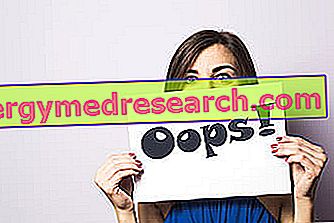Related articles: Postpartum depression
Definition
Postpartum depression is a mood disorder that affects 8-12% of women after childbirth.
In the days immediately following the birth of the child, many new mothers develop a form of transient depression called " baby blues " (in reference to the state of melancholy, irritability and anxiety that characterizes the phenomenon). This is a rather common reaction, often caused by physical and mental fatigue due to labor and delivery. Symptoms are typically mild and usually tend to disappear within 7-10 days.
On the other hand, the actual postpartum depression manifests itself with more intense symptoms, which develop over 3 months and last more than 2 weeks. The disorder therefore interferes with the normal course of daily activities and influences the ability to take care of the newborn.
The exact causes of postpartum depression have not yet been defined, however, if the woman has previously suffered from a depressive disorder, the risk is greater. Many other factors can contribute to the onset of the disease: the hormonal changes that occur during the puerperium (abrupt fall in the hormones estrogen and progesterone), sleep deprivation, lack of support from the partner or family members and genetic predisposition .
Most common symptoms and signs *
- Aggression
- Hallucinations
- anguish
- Anorexia
- Asthenia
- Increased appetite
- Decline in sexual desire
- palpitations
- Delirium
- Depression
- Difficulty concentrating
- Mood disorders
- Muscle pains
- Nervous breakdown
- Insomnia
- hyperphagia
- Social isolation
- Lethargy
- Headache
- Nervousness
- Weight loss
- Mood swings
- Drowsiness
- Dizziness
Further indications
Postpartum depression can manifest itself with extreme sadness, irritability, crying spells without
apparent reasons, lack of energy, easy fatigue and reduced ability to think or concentrate. Headaches and myalgias, sleep disturbances (insomnia or difficulty in staying awake), loss of appetite or hyperphagia can develop. The new mother can present feelings of guilt, low self-esteem and loss of interest in performing routine activities.
In relation to the newborn, women feel inadequate and experience anxiety, excessive worries or disinterest. Postpartum depression also involves difficulties in interaction and attachment towards the child, who can report cognitive, social and emotional development problems. In some cases, postpartum depression even induces recurrent negative thoughts and increases the risk of suicide and infanticide.
Diagnosis is based on clinical evaluation. Postpartum depression should be distinguished from so-called puerperal psychosis, a very rare and more serious disorder. Women who suffer from it experience confusion, severe mood and behavioral alterations, hallucinations and delusions.
Treatment involves psychotherapy or the administration of antidepressant drugs, taking into account the possible side effects on the mother and the newborn, especially in the case of breastfeeding. In the absence of treatment, postpartum depression can resolve spontaneously or evolve into a chronic form.



